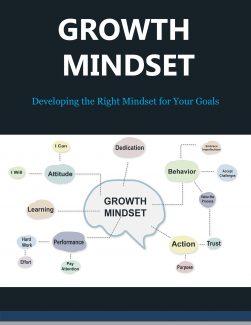
 License Type: Private Label Rights
License Type: Private Label Rights  File Type: ZIP
File Type: ZIP
 SKU: 63753
SKU: 63753  Shipping: Online Download
Shipping: Online Download
Sample Content Preview
When psychologist Carol Dweck began her research career, she was fascinated with why some children, when faced with failure and setbacks, were able to bounce back and keep going while others were crushed. Through her research, she came to realize that the resilient children (and adults) shared one thing in common: they believed that they could grow in intelligence, skills and abilities throughout life. This worldview, which Dweck calls a “growth mindset”, helps build resilience because it suggests that growth is always possible, and therefore, a setback is never permanent.
Dweck has spent over 30 years studying the growth mindset and its opposite, the fixed mindset. She discusses her research findings in her book, Mindset, The New Psychology of Success. Since her research on mindsets has become popular, many more psychologists have supported her thesis, and many schools, universities, and corporations have adopted her ideas as part of their curriculum and training programs. Let’s look at Dweck’s theory of mindsets in more detail.
Fixed versus Growth Mindset
Imagine two students, Susan and Beth, waiting for their teacher to hand back their midterm test. It’s an important part of their mark, but there’s still half a semester to go. They both need to get a good mark in this course to get into the program they want to take next year. They get their tests and look at their marks. They both got a C.
Susan looks at the test, her heart sinking, and thinks, “I’m so dumb. I’m terrible at this course. I’ll never amount to much. I guess there’s no point studying for the rest of term.”
Beth is also upset and disappointed. She looks at her test and thinks, “Wow. I really need to pull up my socks. I’ll have to study more for the next test. Also, I really didn’t get that one concept. I’ll have to talk to the professor and get some extra help.”
Which of these students is most likely to improve in the class, and go on to the program they are working toward?
The answer, based just on this moment, is of course Beth. But what is it about her response to a bad mark that suggests that she’s more likely to succeed?
This example illustrates the mindset of the two students. Susan is demonstrating a fixed mindset, while Beth is demonstrating a growth mindset. Let’s take a look at what these terms mean.
Fixed Mindset
People with a fixed mindset believe that people are born with a certain mix of skills, abilities, intelligence and character, and no amount of work or effort can change these basic facts about a person.
When someone has a fixed mindset, they tend to see the world in binary fashion. There are winners and losers, smart people and dumb people. For example, in the story above, Susan assumes that the midterm test has assess her abilities and found her wanting. There’s nothing she can do, so she might as well give up.
People with a fixed mindset often:
Believe effort is a sign of stupidity (because smart/talented people shouldn’t have to try)
Believe that success or failure defines them
Are reluctant to try challenging activities (in case they don’t do well, and thus prove themselves to be not smart/talented/gifted)
Ignore feedback (because they can’t change anyway)
Feel that feedback is a personal criticism
Feel threatened by others’ success
When someone has a fixed mindset, they are eager to demonstrate their good qualities. A child with a fixed mindset wants to show how smart, talented and good they are. After all, if these qualities are fixed, they want to be on the winning side.
Ironically, this need to demonstrate their skills can lead to rejecting opportunities to improve. For example, Dweck’s research has shown that when children with a fixed mindset are given a choice between repeating an easy puzzle they’ve already mastered and tackling a new puzzle that they could learn from, these children generally choose to repeat the easy puzzle. Why would anyone redo something that’s easy? Because if they try the new puzzle and fail, it might reveal that they aren’t smart after all.
Growth Mindset
In contrast to those with a fixed mindset, people who have a growth mindset believe that one’s talents, intelligence, skills, abilities, and even character traits and interpersonal skills can be developed over time. In this world view, challenges are embraced, and setbacks are viewed as opportunities for learning and growth.
People with a growth mindset don’t see the world as divided into success and failure, winners and losers; they see setbacks as a sign that more effort and perhaps a different strategy is needed to achieve their goals. Of course, setbacks can still sting for a person with a growth mindset, but they don’t see setbacks as failures – just as a sign that they need to work harder.







